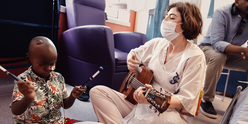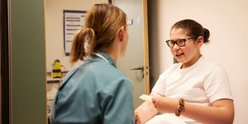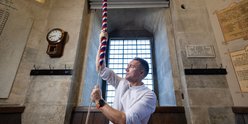'I want nothing to hold him back’: Meet four-year-old Noah
4 Sep 2024, 10:10 a.m.
Noah and his twin, Naima, had just turned two when Noah was diagnosed with blood cancer. Shortly after starting treatment at Great Ormond Street Hospital (GOSH), he had a stroke because of a fungal infection that had spread.
Naima, described by her mum as a “ball of energy,” kept the family going during this time, and moments of joy were found in sessions with the Play team and peaceful visits to the GOSH chapel.
Noah slowly began to recover from the stroke and, after immunotherapy treatment for cancer, he went into remission.
His mum and dad, Dilly and Sabe, share their story.
It was mid-May 2022 when Dilly and Sabe found out their two-year-old son Noah was seriously unwell. He hadn’t been himself for weeks and had been back and forth to the doctor. They became even more worried when, on holiday, they saw he had no energy to splash around in the water park.
When they got back from their trip Noah was worse, so they took him to A&E. It was there that they found out he had blood cancer.
“I was asking, ‘What is the survival rate? Give me the chances,’ because that’s how I process things, but they couldn’t tell me,” Sabe says. “That’s the lowest we’ve been.”
Noah was transferred to GOSH in the early hours of the morning and taken to the intensive care unit (ICU).
“I was so stunned when we got to ICU, it was like a spaceship,” Dilly says. “I was in awe of all the machines, in shock really, and exhausted as it was the middle of the night.
“The team came in and looked after him. They told us everything they were going to do, every step of the way. And he had one-to-one care, which I thought was amazing.”
The following day, Sabe and Dilly spoke with Noah’s consultants, who explained he had acute lymphoblastic leukaemia (ALL) – a rare type of cancer that affects the blood and bone marrow. It usually develops quickly and needs to be treated straight away.
70 nights in hospital
Noah had just finished a month of chemotherapy when he became unwell. He woke up one morning with a temperature and could barely stand.
"He started doing some strange things like holding his arm up in the air,” Sabe says.
An MRI scan at GOSH showed Noah had a fungal infection that had started in his chest, spread to his head, and caused a stroke. He had to stay in hospital for the next 70 nights.
“The first four weeks they were giving him medication for the fungal infection, he wasn’t moving – he didn’t even move his fingers,” Sabe says. “It started getting scary.”
In mid-July, after another MRI showed the fungal infection had gotten worse, Noah had a brain biopsy. From that point on, things slowly started to improve.
“He started moving his hands, holding his neck up a little bit, and sitting up,” Sabe says. “I remember Dilly screaming at the nurses because he sat up by himself.”
Dilly can recall the moment Noah smiled for the first time since the stroke. She says: “His Occupational Therapist Mairi came one day, and you could see him try to smile at her toys. After that session we could see him slowly getting better.”

Noah and mum, Dilly.
Life at GOSH
At GOSH, Noah spent time with the hospital’s Play team. Funded by GOSH Charity, the team uses different types of play to make hospital a little bit easier and a lot more fun for patients, siblings and parents. They also help children prepare for treatment and help ease their worries about being in hospital.
"They were amazing, just fantastic,” Sabe says. “They always had toys and when he had bloods done, they would distract him as the needle went in.
“He loves anything to do with cars, and the Play team would bring a toy garage and a whole bunch of cars to play with. They would even bring Naima toys.”
As well as the Play team, Sabe and Dilly also spent time with the the multifaith Chaplaincy and Spiritual Care team at GOSH – also funded by GOSH Charity.
“We go to the chapel all the time when we go to the hospital,” Sabe says. “I wouldn’t say we’re super religious. I’m not technically Christian, I’m Hindu. But for me it’s just the peace.
"The chaplain was brilliant. We used to tell him dates – for example, when Noah would be having his biopsy – and he would come to see us before. He was super helpful.”
Cancer treatment through a backpack
Noah was discharged from GOSH in September 2022, just after he started walking again.
“Having his twin sister made his rehab so much easier,” Sabe says. “They are the same age, so he will see her running and try and do the same thing.
"He and Naima fight half the time, play well half the time. They do get on really well and they love each other.”
During this time, Noah's cancer treatment changed. He became one of 105 patients to be treated with a medicine called Blinatumomab as part of a study led by clinicians at GOSH for children diagnosed with B-acute lymphoblastic leukaemia who had incredibly bad reactions to chemotherapy.
Noah was given a device that pumped the medicine into his body 24 hours a day. The device came in a backpack, which the family carried around with them.
The treatment had fewer side effects, and the portable pump meant the family could have a taste of normality. “We could give him the rehabilitation he needed,” Dilly explains. “He needed to be outdoors. He needed to be able to move.”
Thankfully, following this treatment Noah went into remission.
“He did two cycles, and his cancer has gone. He has zero leukaemia,” Sabe says. “We found out after they finished the cycles in November 2022. He’s in remission.”

Noah wearing his backpack that held a device which pumped the medicine into his body.
Finishing treatment at GOSH, starting school
Noah will finish his maintenance chemotherapy towards the end of the summer.
“It’s a big date for us,” Sabe says. “We’re planning a celebration. We’ll hire a bouncy castle and an ice-cream truck to come to the house and invite all his school friends and the neighbours. Then the week after we are going away on holiday.”
The stroke has had a “severe impact” on Noah's development, and his balance and coordination have been affected. He’s also been diagnosed with cerebral palsy.
While Dilly and Sabe worry about the future, for now they take each day as it comes.
“I worry about the long-term side effects of the treatment and his stroke, but at one point we didn’t know if he would walk or would talk again, so now we just appreciate every moment with him and with Naima,” Dilly says.
Both Noah and Naima will start school in September 2024.
“It’s a huge milestone for both of them, and for us,” Sabe says. “Noah loves his school jacket and wears it all the time, although he has a button phobia so school uniform might be a bit of a challenge!”
Looking to the future, Sabe and Dilly just want a “normal life” for Noah.
"I want him to have no limitations, nothing to hold him back,” Sabe says.

Noah and his twin sister, Naima.
A new Children’s Cancer Centre
For Sabe, a new Children’s Cancer Centre at GOSH will have a huge impact on families like theirs.
Before stepping foot in GOSH, he’d imagined it as a hospital where everything was “shiny and new” but now realises that, for certain wards, this isn’t the case.
“Safari ward is old. I wouldn’t say it was a shock, I would say that it was me being naïve and thinking that the best hospital in the country for children would have the best looking building in the country.
“It would be great if it could match your expectations, which hopefully it will do [in the future].”
Sabe believes the plans for larger patient bedrooms and family rooms in the Children’s Cancer Centre, as well as separate rooms to talk with doctors, could make “the world of difference”.
“Noah being so young, he wouldn’t have fully understood the conversations we were having with doctors. But if your child was 10 years old, I wouldn’t be comfortable having the conversations that I was having with doctors, if I knew my child was listening in,” he says. “I was asking some very straightforward questions. Things like, ‘Is he going to see again? Is he going to hear again? Walk again?’ You don’t want your child to hear that.”
Sabe also welcomes the outdoor space that is planned for the centre. On one occasion at GOSH, he wanted to take Noah outside for fresh air but he couldn’t because Noah had an infection. Easy access to the outdoors would have made things easier.
"Outside space would be brilliant,” he says.
Noah's story - watch now
No childhood should be cut short by cancer.
Join us to help build the Children’s Cancer Centre at GOSH.






